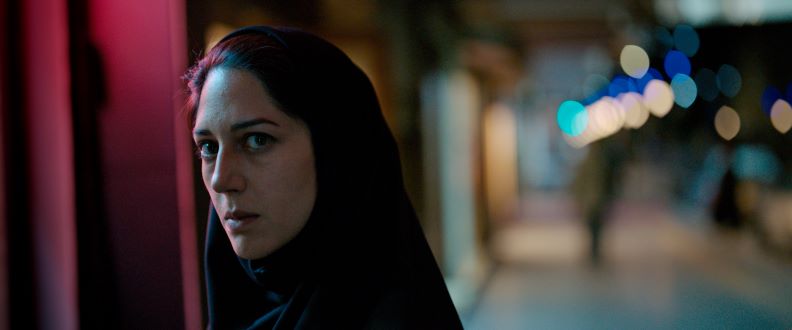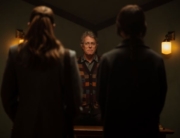Holy Spider leaves you muttering “Holy…” when it ends. Ali Abbasi’s film, based on a true story, unfolds as a serial killer procedural, a gaze into the mind of a fanatic convinced he has God on his side, and a Dickensian uncovering of modern Iran’s sexism, sleaze, and skin trade. This is a harsh, absorbing piece of work uniting pulp thrills and dark psychological powers in a way that recalls The Silence of the Lambs.
The action starts on a note of pathos, even gentleness. A woman bids her sleeping child goodbye as she reluctantly prepares to go out for a night of work. Very particular work. She puts on hot red lipstick and curls a lock of hair outside her scarf—in the Islamic Republic of Iran, this is letting men know she’s for sale. We observe the details of her trade as she slips into high heels, cadges drugs, and sizes up potential johns in the street. At the end of a desperate night, she hesitates to walk down a narrow hallway at the bidding of one persistent client. Like us, she senses she is marked for death, and even though we see death coming, it comes hard. Abbasi has made us empathize with this woman, and her clinical snuffing out feels like a blow to the skull from a 10-pound rock. After following the first victim, the narrative follows the killer (Mehdi Bajestani). Quick, deft scenes reveal who Saeed is and how he strikes. It’s not a spoiler to let you know the murderer is a PTSD-scarred veteran, husband, and father, discontent with his low status in life. He believes he’s on a mission from Allah to clear loose women off the streets. As he corners and strangles his victims in the family home, he grows bolder, and more reckless. (Abbasi winds up the murder scenes to gruesome and even occasionally absurd climaxes). Luckily for him, though, authorities in the holy city of Mashhad don’t seem very keen on stopping his activities. A pursuer on Saeed’s trail has also noticed the police’s lack of interest. Rahimi (Zar Amir-Ebrahimi), a journalist, has swept into repressive Mashhad from more worldly Tehran to get to the bottom of this string of brazen murders—repeat slayings with myriad clues in plain sight, yet stubbornly unsolved. Amir-Ebrahimi gives off weary intelligence and exasperation as Rahimi encounters all kinds of obstruction, condescension, petty and not so petty harassment from the men standing in her way.Drawn deeper into the case, forced to progress from chronicler to sleuth, Rahimi fights fear while darting through the claustrophobic miasma of sinister Mashhad. As one lady of the night remarks, “Everyone looks suspicious here.” Rahimi and her nemesis will meet in a drawn-out, terrifying face-off after dark that feels implausible yet somehow inevitable, and the police will finally be forced almost against their will to get their man. Holy Spider takes a detour into courtroom drama that slows down the pace but deepens the sense of rot, holy city–style. We’ve been treated to pitiless brutality. Now on parade are self-regarding delusion, mob rule, a family legacy of cruelty passed on, and a spectacular double-cross. Events that could be overbearing stay absorbing through crucial details and surprises. Blown up with conceit, the imprisoned Saeed boasts, “Tomorrow you’ll see the invisible hand of God at work!” We do, and God’s ways are even more twisted than we thought. The vengeful ending is perfect for this borderline-lurid film that always manages to stay real—because it knows just how real evil can be.







Leave A Comment